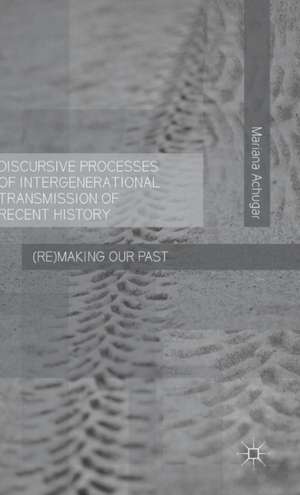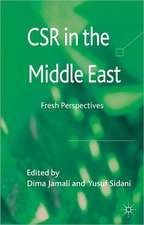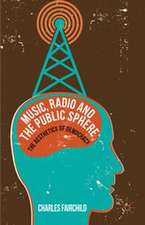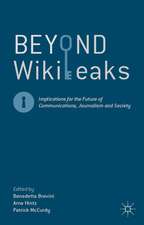Discursive Processes of Intergenerational Transmission of Recent History: (Re)making Our Past
Autor M. Achugaren Limba Engleză Hardback – 3 feb 2016
This book explores discursive processes of intergenerational transmission of recent history through the case of the Uruguayan dictatorship. The main themes of the book are the discursive construction of social memory and intergenerational transmission of contested pasts through recontextualization, resemiotization and intertextuality.
Preț: 389.31 lei
Nou
Puncte Express: 584
Preț estimativ în valută:
74.50€ • 77.98$ • 62.00£
74.50€ • 77.98$ • 62.00£
Carte tipărită la comandă
Livrare economică 31 martie-14 aprilie
Preluare comenzi: 021 569.72.76
Specificații
ISBN-13: 9781137487322
ISBN-10: 1137487321
Pagini: 240
Ilustrații: XIV, 240 p.
Dimensiuni: 140 x 216 x 16 mm
Greutate: 0.45 kg
Ediția:1st ed. 2016
Editura: Palgrave Macmillan UK
Colecția Palgrave Macmillan
Locul publicării:London, United Kingdom
ISBN-10: 1137487321
Pagini: 240
Ilustrații: XIV, 240 p.
Dimensiuni: 140 x 216 x 16 mm
Greutate: 0.45 kg
Ediția:1st ed. 2016
Editura: Palgrave Macmillan UK
Colecția Palgrave Macmillan
Locul publicării:London, United Kingdom
Cuprins
1. Intergenerational Transmission, Discourse, and the Recent History
2. Narratives as Transmission Tools: Learning about the Dictatorship in Uruguay
3. Family Conversations about the Dictatorship: Appropriating Anecdotes and Taking an Affective Stance
4. Arguments with Peers: Negotiating the Past in the Present
5. Conversations in the History Classroom: Pedagogical Practices in the Transmission of the Recent Past
6. Transmission Processes in Popular Culture: Recontextualization and Resemiotization in Music
7. Appropriating the Recent Past: Meaning Making Processes through Time
2. Narratives as Transmission Tools: Learning about the Dictatorship in Uruguay
3. Family Conversations about the Dictatorship: Appropriating Anecdotes and Taking an Affective Stance
4. Arguments with Peers: Negotiating the Past in the Present
5. Conversations in the History Classroom: Pedagogical Practices in the Transmission of the Recent Past
6. Transmission Processes in Popular Culture: Recontextualization and Resemiotization in Music
7. Appropriating the Recent Past: Meaning Making Processes through Time
Recenzii
“Postgraduate students and academics working m the areas of Critical Discourse Studies, Memory Studies and Latin American Studies can benefit greatly from this book. It is coherently organized and approaches the issue of remembering from a diverse methodological and theoretical background, having at its core the relation between language as a semiotic System m its social and historical context and the construction of our individual and social memory and identities.” (Carolina Perez, Journal of Language and Politics, Vol. 17 (05), 2018)
Notă biografică
Mariana Achugar is a Guggenheim Fellow. She works as Associate Professor in the Department of Modern Languages at Carnegie Mellon University, Pittsburgh, USA. Her research explores cultural reproduction and change from a critical discourse analysis perspective. Among her publications is What we remember: the construction of memory in military discourse (2008).
Textul de pe ultima copertă
Debates about how to remember politically contested or painful pasts exist throughout the world. As with the case of the Holocaust in Europe and Apartheid in South Africa, South American countries are struggling with the legacy of state terrorism left by the 1970s dictatorships. Coming to terms with the past entails understanding the role different social actors played in those events as well as what those event mean for us today. Young people in these situations have to learn about painful historical events over which there is no national consensus.
This book explores discursive processes of intergenerational transmission of recent history through the case of the Uruguayan dictatorship. The main themes of the book are the discursive construction of social memory and intergenerational transmission of contested pasts through recontextualization, resemiotization and intertextuality.
This book explores discursive processes of intergenerational transmission of recent history through the case of the Uruguayan dictatorship. The main themes of the book are the discursive construction of social memory and intergenerational transmission of contested pasts through recontextualization, resemiotization and intertextuality.














